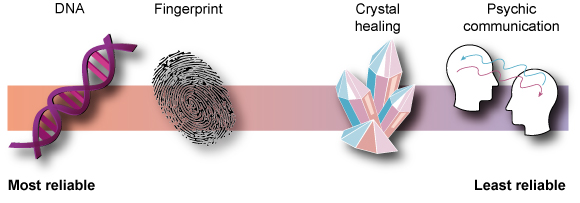2.3 Reliability
Reliability is the question of whether the particular topic is something upon which an expert is capable of having expertise. King CJ, again in Bonython, stated:
whether the subject matter of the opinion forms part of a body of knowledge or experience which is sufficiently organised or recognised to be accepted as a reliable body of knowledge or experience, a special acquaintance with which by the witness would render his opinion of assistance to the court.
On the one hand, there are topics such as fingerprint evidence and DNA evidence that (with some exceptions) are capable of supporting very robust inferences and are generally seen as reliable. On the other hand, there are topics that might include psychic communication or crystal healing that will probably never support robust inferences and are seen as unreliable (even if some people trust them). Between these two extremes are topics where a court may need to determine whether it is sufficiently well-established and scientific to be classed as reliable.
Other jurisdictions, such as the USA, have taken a hard line on the question of reliability. For example, the US case of Daubert v Merrell Dow Pharmaceuticals, Inc.Footnote 5 established that the trial judge exercises a ‘gatekeeping’ function to ensure that the purported area of expertise rests on ‘a reliable foundation’. As such, these issues could not be left to the jury as a matter of weight. Characteristics that were relevant in determining the reliability of a particular area of expertise include:
- whether it has been subjected to peer review and publication
- whether it can be and has been tested
- whether it has a known error rate; and
- whether the research was conducted independent of the particular litigation or was dependent on an intention to provide the proposed testimony.Footnote 6
By contrast, it is fair to say that in England and Wales, the common law courts have historically taken a fairly laid-back attitude to reliability compared to other jurisdictions. They have often considered such issues as a matter of weight, not admissibility (see Hodgkinson and James, 2020, 1-027). This has led to problems such as the admission of pseudoscientific evidence. In R v Dallagher, Footnote 7 the Court of Appeal quashed convictions based partially on ear prints and ordered a retrial. At the retrial, the prosecution offered ‘no evidence’ (meaning the defendant was immediately acquitted) after exonerating DNA evidence came to light. The Law Commission was highly critical of the English and Welsh approach (Law Commission, 2011), but the government at the time declined to legislate. However, a subsequent practice directions (Criminal Practice Directions (2023) Footnote 8 covers much of the same ground and effectively requires courts to now perform an assessment of the reliability of proposed expert evidence.
In the next activity, you will be asked to perform the ‘gatekeeping’ function normally undertaken by a trial judge to determine which of a list of topics might be treated as sufficiently reliable to be admitted as expert evidence.
Activity 2 What do courts consider reliable expert evidence?
Access the Criminal Practice Directions 2023 and read Section 7 on Expert evidence. You can download the most recent version from the Courts and Tribunals Judiciary website [Tip: hold Ctrl and click a link to open it in a new tab. (Hide tip)] (open the link in a new tab or window by holding down Ctrl [or Cmd on a Mac] when you click on the link).
Once you have read Section 7, consider which, if any, of the following areas might be considered sufficiently reliable to be admitted in evidence by a criminal court (subject to also meeting the other criteria). You may need to do a little research if you have not heard of any of these phrases.
Comment
| Evidence | Admissible? |
|---|---|
| Blood types | Yes – this is a very well scientifically evidenced area. |
| Astrology | No – astrology is a pseudoscience that is believed to give information about human behaviour and the future by analysing the positions and movements of celestial bodies. While many people strongly believed in astrology, there is no reliable scientific evidence to suggest that it makes reliable predictions. |
| Astronomy | Yes – not to be confused with astrology, this studies the movement of celestial objects. It is very well evidenced and reliable (i.e., it helped put a rocket on the moon). |
| Handwriting | Yes – this is probably less reliable than other areas, but it is generally treated as sufficiently reliable. You will read more about handwriting in the next section. |
| Homeopathy | No – homeopathy is a pseudoscience based on the assumption that giving a person a small amount of a substance that triggers similar symptoms to their illness will cure them. While many people believe in it, there is no reliable scientific evidence to suggest it makes reliable predictions. |
| Child psychology | Yes – although, it might depend on the particular area of child psychology. |
| Phrenology | No – this is a pseudoscience based on considering the size and shape of the head. It has a controversial history and has been almost entirely discredited. |
Footnotes
- 5 Daubert v Merrell Dow Pharmaceuticals, Inc. 43 F.3d 1311 (9th Cir 1995).Back to main text
- 6 Daubert v Merrell Dow Pharmaceuticals, Inc. 43 F.3d 1311, 584–587 (9th Cir 1995).Back to main text
- 7 R v Dallagher[2002] EWCA Crim 1903.Back to main text
- 8 R v Dallagher[2002] EWCA Crim 1903.Back to main text

